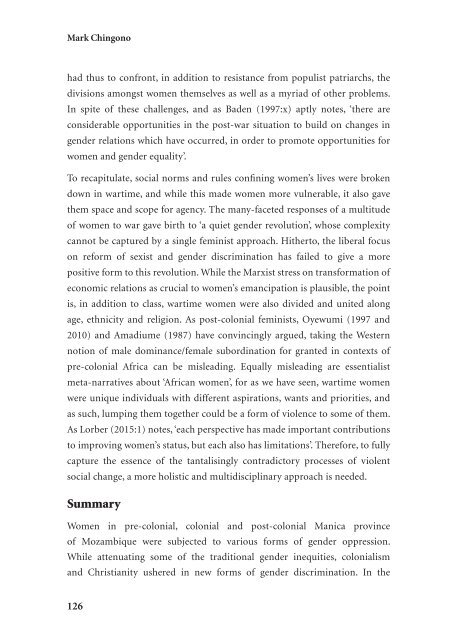ACCORD-ajcr-2015-1
ACCORD-ajcr-2015-1
ACCORD-ajcr-2015-1
- No tags were found...
Create successful ePaper yourself
Turn your PDF publications into a flip-book with our unique Google optimized e-Paper software.
Mark Chingono<br />
had thus to confront, in addition to resistance from populist patriarchs, the<br />
divisions amongst women themselves as well as a myriad of other problems.<br />
In spite of these challenges, and as Baden (1997:x) aptly notes, ‘there are<br />
considerable opportunities in the post-war situation to build on changes in<br />
gender relations which have occurred, in order to promote opportunities for<br />
women and gender equality’.<br />
To recapitulate, social norms and rules confining women’s lives were broken<br />
down in wartime, and while this made women more vulnerable, it also gave<br />
them space and scope for agency. The many-faceted responses of a multitude<br />
of women to war gave birth to ‘a quiet gender revolution’, whose complexity<br />
cannot be captured by a single feminist approach. Hitherto, the liberal focus<br />
on reform of sexist and gender discrimination has failed to give a more<br />
positive form to this revolution. While the Marxist stress on transformation of<br />
economic relations as crucial to women’s emancipation is plausible, the point<br />
is, in addition to class, wartime women were also divided and united along<br />
age, ethnicity and religion. As post-colonial feminists, Oyewumi (1997 and<br />
2010) and Amadiume (1987) have convincingly argued, taking the Western<br />
notion of male dominance/female subordination for granted in contexts of<br />
pre-colonial Africa can be misleading. Equally misleading are essentialist<br />
meta-narratives about ‘African women’, for as we have seen, wartime women<br />
were unique individuals with different aspirations, wants and priorities, and<br />
as such, lumping them together could be a form of violence to some of them.<br />
As Lorber (<strong>2015</strong>:1) notes, ‘each perspective has made important contributions<br />
to improving women’s status, but each also has limitations’. Therefore, to fully<br />
capture the essence of the tantalisingly contradictory processes of violent<br />
social change, a more holistic and multidisciplinary approach is needed.<br />
Summary<br />
Women in pre-colonial, colonial and post-colonial Manica province<br />
of Mozambique were subjected to various forms of gender oppression.<br />
While attenuating some of the traditional gender inequities, colonialism<br />
and Christianity ushered in new forms of gender discrimination. In the<br />
126


